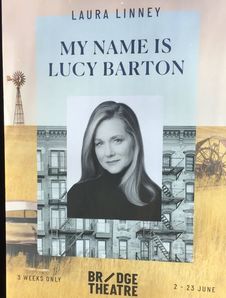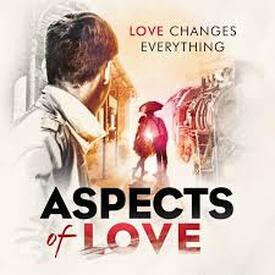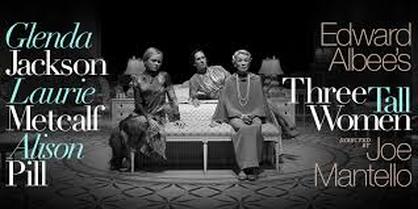 “The Rink” at Southwark Playhouse: Excellent Production Gives New Life to Kander & Ebb Showby Randi / June 14, 2018
“The Rink” at Southwark Playhouse: Excellent Production Gives New Life to Kander & Ebb Showby Randi / June 14, 2018
The best one-man shows are those that make you forget that only one person is up on that stage. It takes an enormous talent to fill a theatre so completely that you feel the force of a whole company entertaining you with their stories. The last time (maybe only other time?) I felt like a stage was filled with several great entertainers instead of just one was in Michael Urie’s brilliant one-man show Buyer and Cellar. Now the wonderful Laura Linney manages to achieve a similar result in The Bridge Theatre’s “My Name is Lucy Barton”, in which she tells her story so vividly and describes other people so keenly that it feels as effective as a play with a big ensemble. She distracts you from how hard she’s working up there with how realistic her storytelling is. Directed by Richard Eyre, this moving tale of one woman’s struggles to come to terms with her past while recognizing her internal pain is at times funny, depressing, and surprisingly universal in its representation of the humanity of loneliness.
At first, I’m watching Linney say interesting words about how sick she was (if I recall correctly, they never really say what the issue was) and how her relationship with her mother was rough to say the least, but after about 10 or so minutes, Linney became Lucy Barton, and although I was still staring at Linney’s amazing face dimples (definitely one of my top five favorite face dimples), I was watching Lucy tell her story. She told her story of her hospital stay while interweaving details from her past, her terribly rough childhood out in the sticks of Illinois with her father, who had PTSD from the war, her cold mother, her siblings who it seems she never bonded with, and all the abuse she suffered, even as a young child who couldn’t understand why she was being punished. Her storytelling is peppered with thoughts about how hard it was to be so lonely in that hospital room, and then her loneliness becomes the driving theme of her entire existence, developed in her pitiful childhood.
Honestly, I just read Orphan Train this week and I’m getting the horrible childhood details from that book confused with Lucy’s, that’s how bad it was. We learn that as a young girl her parents would lock her in her dad’s truck sometimes at night, and she would scream for them to let her out. Even when a snake was in there with her, they wouldn’t listen to her screams. With that kind of detail, you can’t help but despise her mother and understand how big a deal it was that she visited her sick daughter, coming all the way to New York City when she is scared of traveling, and how anxious Lucy was about it even though a large part of her was happy to have the comfort of family. I mean it’s the least she could do. Linney’s, or Lucy’s, imitations of the mother were superb, with that thick Chicago-area accent and the too accurate recounting of how gossipy she is. I don’t remember the mother’s name but I remember her tales of her frenemy Cathy Neely, because of how often the mother talked about this woman, spitting out her name with pure venom and those exaggerated mid-West vowels. I LOVED how at one point in Lucy’s mother’s chitchat including a tidbit about a girl Mary who got married and the vowel she used for Mary and marry was the same, which is such a precise dialect detail that I almost stood up and shouted GIVE HER AND HER VOCAL COACH ALL THE AWARDS. I’m kind of obsessed with the Mary/merry/marry dialectical test because as a Philadelphian we are among the few, we happy few, who pronounce all three distinctly. Anyway.
Linney is pitch-perfect as she unfolds the truth behind why Lucy’s relationship with her mother is so strained, and why her loneliness feels like the main disease she’s suffering from, more debilitating and hopeless than whatever has been keeping her in the hospital for months. It’s such a full-bodied recounting that it feels like all the characters she mentions are up there with her, shoring up her tale. I was especially struck by the idea of her neighbor and friend Jeremy, and when Lucy spoke of a man dying from AIDS that she saw in the hospital, I immediately thought of him. When she carried on with her story, I brushed away the thought, but at the end her heartbreaking final thoughts circle back in what I thought was the most moving part of the story. She talks about what it was like to reconnect, or try to reconnect, with her estranged mother after all these years, and about her childhood and all the experiences that shaped her, but her story was mostly confiding in us about how lonely she was, no matter what she tried to do about it.
It’s really remarkable, and a testament to the skill of the writers as well as to Linney’s acting, how much the audience feels it knows Lucy and how much we learn about her life, simply by listening to her tell us about her hospital stay, something that seems so mundane and uninteresting. At the end, she again comes to the most downstage point and looks directly at us to share her most private thoughts and pains, pounding on her chest in one of the most powerful theatre moments. You’re so invested in Lucy’s emotional distress that you almost forget you’re watching Linney, as she makes a compelling London debut and receives a much-deserved standing ovation.
INFORMATION
The Bridge Theatre put in Linney’s programme bio that she was in “Teenage Mutant Ninja Turtles” but not that she was in “Dave”, the BEST MOVIE EVER and her character’s name was RANDI and she wasn’t a gross man so like FIX IT, BRIDGE.
Also fix your late seating policy. It was nonsense how many people were seated 20 minutes into the show. Just stop allowing late seating, all theatres. If someone is late and it’s not their fault let them exchange their tickets. I mean people who missed 20 minutes missed a LOT of information; it’s not even worth seeing it. And it was so distracting to everyone else.
STAGEDOOR
The stagedoor is around the side of the complex closest to Tower Bridge, past the Ivy restaurant and then next to the By Chloe that’s there. We only waited 10-15 minutes because it was disheartening to see how many Londoners were still supporting that restaurant’s shitty owners. Anyway, the people working inside said she isn’t consistent about which exit she uses, and I guess they couldn’t find out if she was planning to come out that way, and I was cold, so we left.






